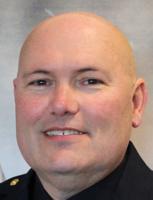Three people were arrested outside the Lululemon retail store at the Hillsdale Shopping Center Wednesday afternoon with about $1,400 in stolen…
San Mateo police officers responded to the 800 block of Highland Avenue on a suspicious circumstance report involving possible mail theft Wedn…
Sheriff Ken Binder now has a full executive team leading the San Mateo County Sheriff’s Office after internally promoting former captains Fran…
President Donald Trump has threatened to invoke the Insurrection Act and deploy troops to quell persistent protests against Immigration and Customs Enforcement officers in Minneapolis. Trump made the threat Thursday. A day earlier, a federal officer in the city shot and wounded a man who had attacked the officer with a shovel and broom handle. Minneapolis has been on edge since an ICE agent fatally shot Renee Good in the head. Trump has repeatedly threatened to invoke the rarely used 1807 law to deploy the U.S. military or federalize the National Guard for domestic law enforcement, over the objections of state governors.
Local chapters of Indivisible, a nationwide activism organization, are mobilizing in solidarity this weekend to protest ICE in Redwood City.
Redwood City officers arrested a man earlier this week after he was accused of pointing a gun at another customer at a gym last month, accordi…
U.S. President Donald Trump's latest threats against Greenland pose a new and potentially unprecedented challenge to NATO, perhaps even an existential one. The alliance is normally focused on external threats, but it could now face an armed confrontation involving its most powerful member. The White House says the administration is weighing options that could include military action to take control of the strategically located and mineral-rich island. Greenland is part of NATO ally Denmark. Trump's designs on Greenland could put at risk the entire future of NATO, which was founded in 1949 to counter the threat to European security posed by the Soviet Union.
The Trump administration has added seven countries, including five in Africa, to the list of nations whose passport holders are required to post bonds of up to $15,000 to apply for visas to enter the United States. Thirteen countries, all but two of them in Africa, are now on the list. It makes the process of obtaining a visa unaffordable for many but U.S. officials say it is an effective deterrent to prevent foreigners from overstaying their visas. The State Department last week quietly added Bhutan, Botswana, the Central African Republic, Guinea, Guinea-Bissau, Namibia and Turkmenistan to the list. Those designations took effect on Jan. 1. It's the latest effort by the Trump administration to tighten requirements for visa applicants.
The FBI says it disrupted a New Year's Eve attack plot in North Carolina, arresting an 18-year-old who allegedly pledged loyalty to the Islamic State group. Christian Sturdivant is charged with attempting to provide material support to a foreign terrorist organization. Authorities say he shared attack plans with an undercover FBI employee. Sturdivant was arrested Wednesday and remains in custody. An attorney representing him did not respond Friday to requests seeking comment. The investigation began last month after authorities linked Sturdivant to a social media account that posted content supportive of IS.
Police in San Francisco on Monday arrested a man they suspected of killing a dog, the department said.















